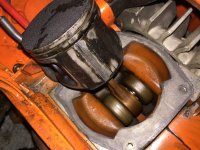Flame Speed, Octane Number & Horsepower
Faster Flame Speed Is Always Better For Maximizing Horsepower
There is a lot of misunderstanding about the relationship between flame speed, octane number, and horsepower. There are some connections between these items, but not as many as some people think.
FLAME (burn) SPEED:
THe speed at which the air fuel mixture in a combustion chamber is consumed becomes critical in a racing engine. At 6000 RPM, each spark plug fires 50 times per second. That's a lot of combustion processes happening in a very short time in the same combustion chamber. This is why racing gasoline need to be capable of burning fast. In your daily driver that may not see the top side of 3000 RPM, flame speed is not as critical. In a racing engine, everything is happening much faster, and in a bigger way because the throttle is wide open. The gasoline must burn as completely as possible to make the most possible horsepower. If the gasoline does not get burned in the time allowed, there will be unburned hydrocarbons coming out the exhaust pipe. Besides not making any horsepower for you, the unburned product contributed to air pollution. Flame speed is determined by the hydrocarbon components in the gasoline. It is critical to making max power, but not related to octane quality.
OCTANE NUMBER:
The octane number of a gasoline has little to do with how fast it burns or how much power the engine will make. Octane number is the resistance to detonation. If the octane number is high enough to prevent detonation, there is no need to use a higher octane gasoline since the engine will not make any additional power. Octane number is not related to flame (burn) speed either. Variations in octane quality are independent of flame speed. There are some high octane gasolines in the marketplace with fast flame speeds and some with slow flame speeds. It depends on how they are put together. We prefer fast flame speeds because we know that a properly tuned engine will make more power on this type of gasoline than one that has a slower flame speed.
POWER:
The ultimate goal in the racing gasoline business is to convert chemical energy from the gasoline hydrocarbons into mechanical energy or horsepower. The most efficient way to convert the gasoline into horsepower is to have the correct air-fuel ratio and the correct spark timing. A mixture that is too rich or too lean will not make maximum horsepower. The same is true of spark timing: to much or too little will compromise engine output.
OVERVIEW:
As indicated above, flame speed and octane number both impact the amount of power that an engine will develop, but they are independent of each other. To get maximum power from an engine, one must have a gasoline with adequate flame speed (faster is always better), and adequate octane quality to support the combustion process. Tied in with the optimized air-fuel ratio and the spark timing, we have a winner.








